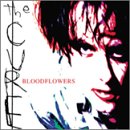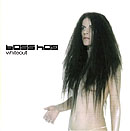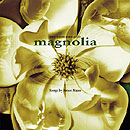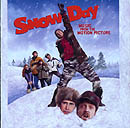|
|
 |
 |
|
by Kat Kinsman, Kerry Burke, Eric Diesel & Lissa Townsend Rodgers
|
| |

The Cure
"Bloodflowers"
(Elektra)
Depressing teenagers generally proves to be about as challenging as convincing Robert Downey Jr. to have just one more for the road. Creating over 20 years' worth of continually fresh and increasingly elegant ways of saying "Love dies, and gosh, I'm really sad about it"—now that takes effort. Since 1979, the Cure has provided the soundtrack to dimly lit dorm rooms and suburban basements around the world.
However, with the release of their 13th studio album, Robert Smith and Co. have finally made a record that people well past their prime brooding years can listen to in their cubicles without fielding co-workers' gentle queries as to whether they've taken their Prozac yet that day. Not to say that the band has forsaken their dank and seratonin-challenged roots. "Bloodflowers" navigates the same dark waters as 1982's stunningly bleak "Pornography" and the frostbitten 1989 epic "Disintegration," but seems to have set its course toward somewhat warmer shores—more likely to conjure emotion from a conversational lyric and a dizzy piano riff than the easy chill of a ragged howl and a tide of icy synth.
The Cure's best efforts in this vein have been intoxicating mixes of simple, blissful vocals and starkly plucked melodies on top of layers of cloudy atmosphere, and the opening track is one of their most successful such syntheses. The crashingly gorgeous "Out of This World" tickles giddy piano scales and a gentle, lyrical lament against a lope of blurred guitars, providing some of the most sublime musical moments in the band's two-decade history. While the rest of the album takes a slight turn for the sonically murkier, it is (with one or two exceptions) quite frankly less embarrassingly depressing than previous efforts. Gone are the ghosts, gray cats and bleak metaphors of past work, in favor of lyrics rooted much more firmly in the everyday exchange.
The Cure have remained seemingly impervious to more than 20 years' worth of fad and fashion. Resolutely pale-faced and fright-wigged, they seem to live in a sphere somehow exempt from the pressures of commercial successes, recording marathon lost love paeans that will probably never see airplay outside college radio. Still, "Bloodflowers" will no doubt draw the usual loyal and cultish following and perhaps even attract a few new fans—who will listen to them with the lights on. —Kat Kinsman
|
|
 |
Boss Hog
"Whiteout"
(In the Red)
 For the first half of the '90s, Boss Hog was everything hot New York underground rock could deliver. Guitars tore through catchy riffs, tempos shifted on a dime, horns wailed and catwalk model Cristina Martinez had enough talent, authority and charisma to make even hubby and downtown icon Jon Spencer into a sideman. Martinez and Spencer's combo of danger, sex, innovation and hooks thrilled more than just hipsters. In 1995, Boss Hog had a major label deal, a happening new record and huge cross-over potential. Then the couple had a baby (yes, he looks like Elvis); Spencer's other band—the Blues Explosion—took off, limiting his time to work with the Boss; Boss Hog's label got consumed in Seagram's Universal/Polygram merger; and the new conglomerate dropped the band, despite their debut's brisk sales.
For the first half of the '90s, Boss Hog was everything hot New York underground rock could deliver. Guitars tore through catchy riffs, tempos shifted on a dime, horns wailed and catwalk model Cristina Martinez had enough talent, authority and charisma to make even hubby and downtown icon Jon Spencer into a sideman. Martinez and Spencer's combo of danger, sex, innovation and hooks thrilled more than just hipsters. In 1995, Boss Hog had a major label deal, a happening new record and huge cross-over potential. Then the couple had a baby (yes, he looks like Elvis); Spencer's other band—the Blues Explosion—took off, limiting his time to work with the Boss; Boss Hog's label got consumed in Seagram's Universal/Polygram merger; and the new conglomerate dropped the band, despite their debut's brisk sales.
Five years later, Boss Hog returns to make good with "Whiteout." The new record takes a bold new direction shaped by a slew of all-star producers: Gang of Four 's Andy Gill, Cardigans producer Torre Johansson, the The's Roli Mosimann, Jim "Foetus" Thirwell and Bad Seed Jim Sclavunos. Electric organ riffs backdate "Whiteout" to the blue-eyed R&B '60s, but electronica synth effects make the CD millennially hip. Cristina Martinez expands on her punk Fury persona to become seductress-turned-soul diva. Jon Spencer's guitar still rages, but "Whiteout"'s hard funk bass keeps the disc dancefloor honest.
"Get It While You Wait" is dedicated to the couple's toddler but it is anything but a lullaby. The bass wends sinisterly forward, Martinez's voice moves toward some dark inevitable while keys climb to crescendo and horns exult to guitar barrage and rock backbeat. "Stereolight" could be a clubland hit: Ethereal keys morph, dancefloor drum samples work your body and Martinez's vocals flip through different aural planes. One trippy break repeats the chorus, but from another planet, while bass throb and white noise guitar keep the track rock-and-roll real.
Swaggering call-and-response duets between Martinez and Spencer are central to any Boss Hog affair. The sexual frisson of the vocals builds while the instruments blare ("Chocolate" and "Nursery Rhyme"). On the new record, the exchanges have a seamless re-mix aesthetic ("Jaguar") made popular by club music and current sound production technology. "Whiteout" is a brilliant combination of groove and danger, edge and dream, rhythm and noise, guitar riffs and electronic effects. Half a decade after their major label debut, Boss Hoss returns, redeeming downtown's underground rock scene with a contender for best CD of the still young year. —Kerry Burke
|

|
Aimee Mann/Various Artists
"Magnolia" Soundtrack
(Warner Brothers)
 Paul Thomas Anderson's ability to extract poetry from the inarticulate extends to the soundtrack for his film, "Magnolia," which avoids the usual problem of old whine in new bottles by buttressing Aimee Mann's melodic turmoil with '70s AM radio gold. Hearing Supertramp's "Goodbye Stranger" and "The Logical Song"—gems from the days when the rock singer's job description wasn't encumbered by camera-readiness—you remember that you love these songs, and you've missed them. Likewise, the sly intersection of Mann's unplugged reading of Three Dog Night's "One," which opens the album and sets the stage for an exploration of the great beauty of sadness.
Paul Thomas Anderson's ability to extract poetry from the inarticulate extends to the soundtrack for his film, "Magnolia," which avoids the usual problem of old whine in new bottles by buttressing Aimee Mann's melodic turmoil with '70s AM radio gold. Hearing Supertramp's "Goodbye Stranger" and "The Logical Song"—gems from the days when the rock singer's job description wasn't encumbered by camera-readiness—you remember that you love these songs, and you've missed them. Likewise, the sly intersection of Mann's unplugged reading of Three Dog Night's "One," which opens the album and sets the stage for an exploration of the great beauty of sadness.
Mann has honed her moody lyricism with an intellectual detachment that her pseudo-folkie progenitors would be smart to absorb. She's spent enough nights alone with her guitar to refine perceptions into bouquets of uplift and gloom, executed beautifully. "Build That Wall" and "Driving Sideways" sublimely navigate the labyrinthine awkwardness of modern adult-to-adult contact—and are presented, amazingly, without a touch of acoustic preciousness. Mann's lyrical simplicity balances her complex context, executed with the sonic purity everyone thought Simon & Garfunkel had taken with them. With "Magnolia," Mann evokes the humid atmosphere in which a tree grows, blossoms and fades. Pair that with dippy '70s AOR, and you have a moving contemplation of misery and hope. —Eric Diesel
Various Artists
"Snow Day: Music from the Motion Picture"
(Geffen)
 While it's as disposable as toilet paper, I wouldn't suggest you wipe your ass with this CD—although that's just due to potential discomfort, not because it isn't worthy of being shit upon.
While it's as disposable as toilet paper, I wouldn't suggest you wipe your ass with this CD—although that's just due to potential discomfort, not because it isn't worthy of being shit upon.
"Snow Day" features the latest entry into the precocious blonde nymphet sweepstakes, Hoku, who adds to her insipidity not through the usual Mousketeerhood but by being—get this—Don Ho's daughter. The song, entitled—get this—"Another Dumb Blonde" is the expected brassy, bouncy, brainless knockoff with a vocoder and no hook whatsoever. Then there's the quintuple boy-band whammy of tunes from LFO (worst rap I've ever heard, worse than the Tommy Lee album), 98 Degrees (treacly ballad) and Boyzone (hey, one of these guys can actually sing) and Mytown (even treacly-er ballad). Let us gloss over the efforts of geriatric boy toy Jordan Knight entirely.
Dropped in the middle of this batch of poisoned ear candy is a perfectly groovy punk rock Hammond B3 tune from Smashmouth ("Come on Come On") and the Hippos' catchy little Elvis Costello-meets-the-moog ditty ("Wasting My Life"). I hope both bands were well-compensated. As a final offense to your ears, this disc closes with Foreigner's "Waiting for a Girl Like You," just to remind you that people have always made records worthy of a good wipe. —Lissa Townsend Rodgers
|

Send feedback here. |
|
|
|
|
|
|
|